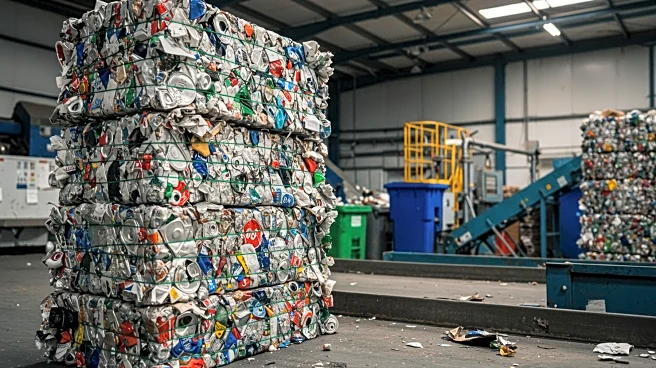What's Happening?
The recycling industry is experiencing a notable influx of tonnage, particularly in the West Coast Indian and Pakistani waterfronts. This development follows a period of losses across various sectors in the dry bulk range, leading to a 5% decrease in the overall benchmark index. Cash buyer GMS reports that despite recent deliveries of diverse vessel sizes and types, the sentiment in the Indian sub-continent remains cautious. The ongoing tariff issues under President Trump's administration continue to create confusion and frustration in global trade markets. The industry had anticipated a recovery in recycling performance in 2025 to compensate for the slower activity in 2024, but this has not materialized as expected. Large LDT LNG carriers have been sold for recycling, yet market activity at bidding tables remains subdued.
Why It's Important?
The influx of tonnage and the cautious sentiment in the recycling industry highlight the broader impact of global trade uncertainties, particularly those stemming from tariff policies. The recycling sector is crucial for managing over-aged vessels and maintaining environmental standards. The slow recovery in recycling activity could affect the industry's ability to handle the backlog of vessels needing recycling, potentially leading to environmental and economic challenges. Countries like India and Bangladesh are navigating these complexities, with India focusing on non-ferrous units amid tariff concerns. The situation underscores the need for stable trade policies to support industry growth and environmental sustainability.
What's Next?
The recycling industry may need to adapt to ongoing trade uncertainties and tariff issues. Stakeholders might seek to negotiate better terms and upgrade facilities to remain competitive. The industry could also explore alternative markets or strategies to manage the influx of tonnage effectively. Monitoring the impact of tariff policies and potential sanctions will be crucial for recyclers to navigate future challenges. The industry's response to these dynamics will likely influence its long-term viability and environmental impact.
Beyond the Headlines
The recycling industry's challenges reflect broader economic and environmental implications. The need for effective recycling processes is critical for reducing environmental impact and supporting sustainable practices. The industry's response to trade uncertainties could influence global recycling standards and practices. Additionally, the situation highlights the interconnectedness of global trade policies and environmental sustainability, emphasizing the importance of coordinated international efforts to address these issues.









